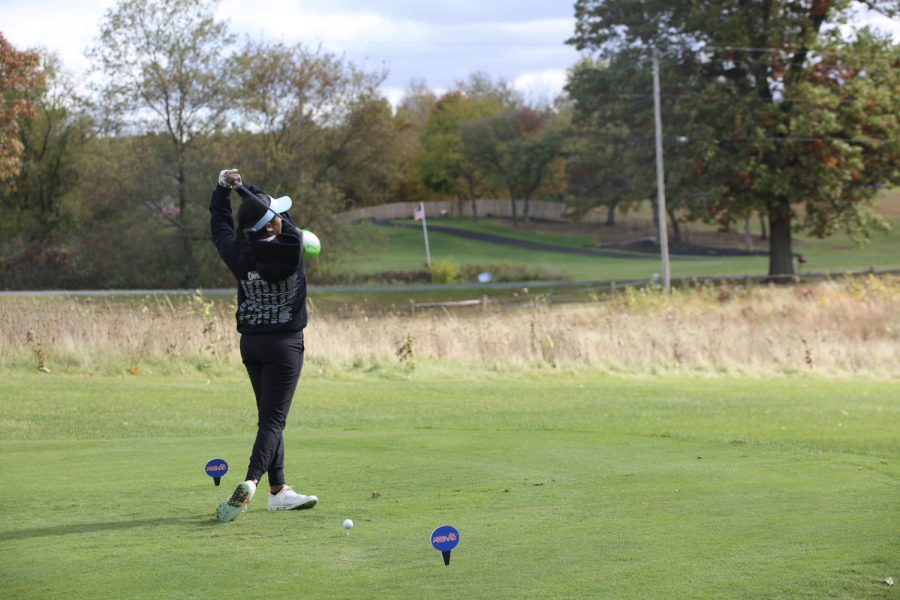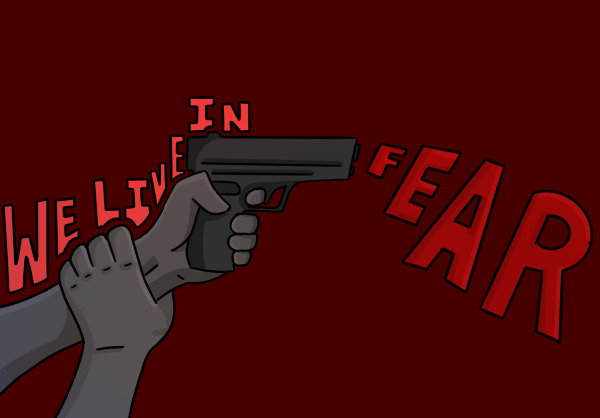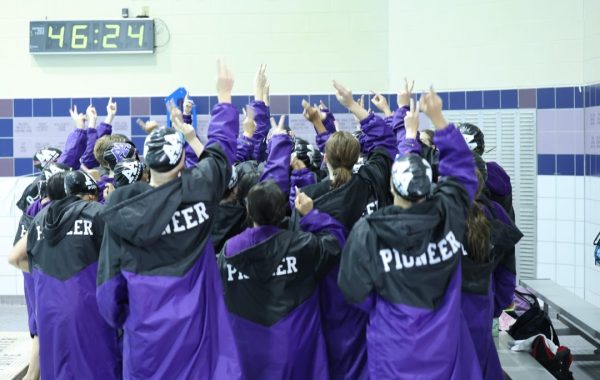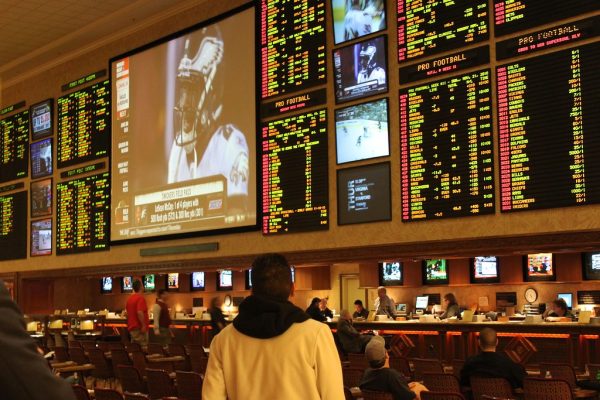Personal Bests in Sports: How They Affect Us
Vedha Kakarla hits a shot at the MHSAA Women’s Golf Division 1 State Championship
Earlier this year, Ali O’Brien, a CHS junior, played a round of 18 holes and shot her personal best of 85.
“I was extremely happy with myself and the way I played,” O’Brien said. “It encouraged me to keep trying to shoot low and to focus on what I need to do to be able to get better at the game of golf.”
Though achieving her best score made her really happy, she also feels that there can be some negative consequences to personal bests.
“Truthfully, I try not to focus on my personal bests,” O’Brien said. “I try to focus on what I could possibly shoot that day. A personal record is your crowning achievement, and even though I always try to aim for another personal best, even getting close to your it is still an amazing achievement.”
There are so many different ways to define a personal best. Melissa Schmidt, head coach of the Ann Arbor Skyline Women’s Golf team defines it as when a player mentally and physically plays the best they can, often breaking a personal record. A personal best can also show a player’s ability to overcome a struggle and that is something to triumph over as well.
Traci Blancke, a social worker at Community High School feels that the power of showing up is really key when it comes to aiming to achieve a personal best. Though they can really help a player’s self-esteem and motivation to keep doing a certain activity, they can also have some negative consequences.
“Personal bests are a doubled edged sword,” Schmidt said. “They can really motivate you if you’re a highly competitive person. But if you only hit personal bests [once in a while], and you’re always chasing [them], it can be kind of defeating when you don’t achieve [one] as quickly as you want.”
When the negative consequences overweigh the positive outcomes, the concept of a personal best can often put us down and make us feel bad about ourselves. When we set a time frame in our minds to achieve a goal or top our limits, it can distract us from the small moments in sports that make us want to keep playing. Making a par putt, hitting a game-winning jump shot, or scoring a tie-breaking field goal are oftentimes what motivate athletes to keep working hard and get better. But when we start focusing on how we want to score the most points or shoot our lowest round, we for get about the little things because we’re aiming for the bigger picture. Though this can be good for some, it can also be detrimental to others who struggle with defeat.
Personal bests are like a competition within yourself. Nobody is stopping you and nobody is in your way. So when you don’t achieve the personal best that you were aiming for, it can be hard to accept the fact that that day wasn’t your day. It can be a constant tug-of-war between the side of you that says there’s always next time and the side of you that says that you’re not good enough and you could have done better. It’s always good to have a goal and a vision that you’re constantly striving for, but at the same time, when that vision of getting a personal best starts to interfere with your love for that sport, it can become more of a burden than a motivator.
As a multi-sport athlete who struggles with self-confidence within the sports I play, I find personal bests can put me in a self-destructive mode. For example, a couple of weeks ago, my golf team at Skyline made it to the State Championship for the first time in our program’s history. My season had been steadily going up-hill, filled with personal records and accomplishments I never thought I’d achieve in my freshman year. At the championship, I ended up playing the worst two rounds of golf I had played all season. Both rounds started great, but as I moved through each of the 18 holes, I started to tear myself down over each bad shot. I would over-analyze them until I was on the verge of tears. Instead of moving past one bad shot or one bad hole, I would freeze myself in time and make myself feel so much unnecessary pressure. In the moment, I thought that pushing myself harder and harder would help me to succeed, but all it did was make me spiral down a trail of mental self-destruction. Towards the end of both the rounds, I couldn’t hold it in anymore. Everything I was feeling came out. As I cried and embarrassed myself in front of a crowd of almost 200 people, I felt ashamed. Not only at the fact that I was crying over a stupid round of golf but also because nobody had done this to me. It was all me, I tore myself down, I fed negative thoughts into my head and I pushed myself to tears. Nobody had said anything bad to me, nobody had made me feel discouraged or not worthy. I had done all of this myself. I was so consumed about how I wanted to perform my best at the State Championship, that when it really mattered, my mental game shattered to pieces. All my mechanics and skills were still there but I wanted to shoot my best score so badly that I let it get the best of me. I let it control me and make me mentally weak.
What I learned most from that experience came from the car ride back home. I took the time to go through the reflective process, about where I went wrong and what I could’ve done better. This time though, I didn’t tear myself down, instead I picked myself up. There’s nothing I can do about how I performed at the State Championship. What I can do is learn and grow from my experience.
In any sport, if you don’t learn and grow from the process of aiming and achieving a personal best, it can start to turn into something that doesn’t serve you and instead hurts you. So if you ask me, as long as you don’t get consumed by the thought and concept of a personal best, it can help you get better and go to the next level but if you do the opposite and let it take you over, it can bring you down, negatively affect your mental health, and make you lose your love for a sport.














